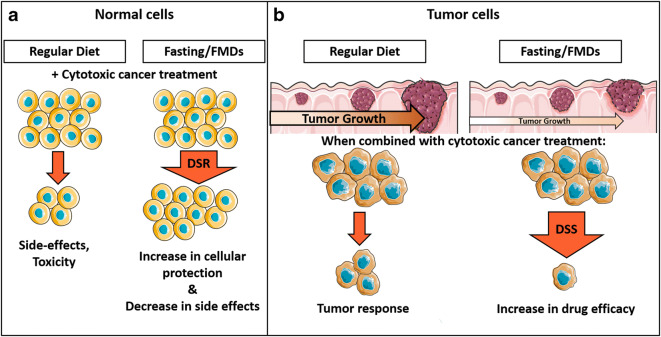Fig. 1.
Fasting or fasting-mimicking diets improve chemotherapy efficacy and protect normal cells against cytotoxic side effects. (A) A nutrient-rich environment promotes cellular growth of normal cells, making them susceptible to the cytotoxic effects of many chemotherapeutic agents. Fasting or fasting-mimicking diets (FMDs) decrease IGF-I and glucose and result in reduced signaling through the intracellular nutrient-sensing cascade, thereby halting cellular growth but promoting a differential stress resistance (DSR). The activation of intracellular stress resistance pathways decreases cytotoxicity and drug treatment–related side effects. (B) In a well-nourished environment, nutritional requirements for unregulated cellular proliferation are met and tumor growth is supported. Treating the cancer with chemotherapeutic drugs yields the expected response and the tumor mass shrinks. Fasting or FMDs greatly limit the availability of metabolites required to sustain the unregulated growth of malignant cells, resulting in reduced cancer growth or shrinking of the tumor. Combining chemotherapy with fasting/FMDs is associated with two beneficial scenarios: (1) fasting/FMDs induces the activation of protective response in normal cells, whereas mutations in cancer cells prohibit the activation of the cellular stress response; (2) fasting/FMDs sensitizes malignant cells to chemotherapy treatment and thereby increases treatment efficacy, referred to as differential stress sensitization (DSS)

